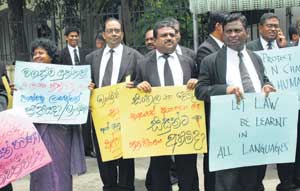The Colombo Magistrate’s Court lawyers who protested against the decision to hold the Law Finals in English only deserve to be praised for their courage; and equally deserving of praise, for their wisdom, are their peers across the road who decided that “discretion is the better part of valour”.
Look at the problem objectively and you will see that both sides in this controversy are justified in their points of view. However much we love our mother tongue, we have to accept the hard reality that it is impossible to master the law without a sound foundation in English. The best literature on the subject is not yet available in the national languages.
On the other hand, most of us who get into the Law College do so only after a hard struggle. The “haramanises” from village schools (like me) cannot use the Queen’s language with the felicity of the “cultured” set from the privileged schools. This disparity is a product of history and the inequities of our education policies, for which the disadvantaged aspirants for a legal education cannot be held responsible or discriminated against.
Some argue that the new rule violates the fundamental right to language guaranteed by Article 12 (2) of our Constitution. They forget that exceptions to the guarantee are permissible under the Proviso to the same Article, which states that knowledge of another language is essential to the successful execution of an assignment.
The problem boils down to the question: “Is English essential to the profession of a lawyer?” To my mind, the answer is both “Yes” and “No”.
For practical purposes, work in the inferior courts, especially the magistrate’s courts, can be handled without a strong background in English. The vast majority of our lawyers are engaged in those courts.
But a sound knowledge of English is essential for lawyers appearing in the superior courts; their work calls for great erudition and a deep understanding of the intricacies of law and of texts that are available in English only. The relevance of English to a lawyer thus depends on the level at which the lawyer chooses to operate.
These two distinct levels of practice were recognised by those who introduced us to the current legal system. Law students who chose the “Heenayana” passed out in three years as proctors, while the “Mahayanists” became advocates in four years.
 |
| Lawyers protesting against the decision to hold the Law Finals in English only |
This pragmatic distinction, based on the personal choice of a student to suit his/her circumstances and aspirations, was removed by those progressives who came to power after independence and cast both categories in the same mould of “Attorney at Law”.
This pious fiat has been observed ever since by lawyers voluntarily classifying themselves as “counsel” and “instructing attorney”, the former undertaking the burden of argument despite not having that extra year of instruction that the advocates enjoyed, and the latter doing the spadework like the proctors of yore. A large majority of today’s attorneys belong to the latter category. Thus the pragmatism of the colonials has been lost in the lofty idealising of the socialists.
But however sound the traditional classification may appear in hindsight, it is not pragmatic to revert to it now. It is too late in the day to attempt that. Nevertheless, I can see a way to maintain and empower those who seek to work as counsel, without disturbing the livelihood of those who are satisfied to operate at the lower level, and without disrupting the Law College’s established examination structure.
An answer would be to introduce an annual Senior Attorney at Law (SAAL) Examination in the English Medium, using an extensive and intensive syllabus in line with the demands of the superior courts. The new examination may be taken at any time by those who have passed the final examination of the Law College, according to their individual needs, competence and dedication to work. This innovation would create a new class of gentlemen who are genuinely learned in the law.
Over time, these persevering senior lawyers will naturally further expand their knowledge through postgraduate examinations and research, producing a calibre of professionals that the country could justly be proud of. Furthermore, this class of lawyers would not be exposed to the vagaries of political favour as they seek to upgrade themselves.
The new exam will not take the bread from anyone’s mouth. It could happen with a change in the medium of instruction at the Law College’s final exam, and no valid constitutional objection could be raised against it. In the interests of the legal profession, the additional qualification could be made compulsory for higher appointments and promotions. Needless to say, lawyers who possess the qualification would enjoy a special status among clients.
In short, the proposed SAAL would help expand the knowledge base of the legal profession, which should be one of the goals of those in charge of legal education. Furthermore, there would not be the risk of exposure to constitutional objections and professional strikes. | 
